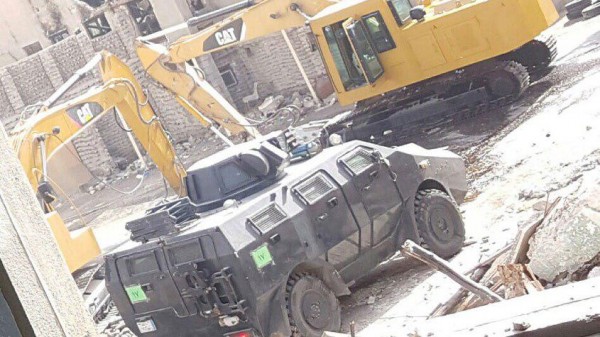24 May 2017 – The UN Special Rapporteurs on cultural rights, adequate housing, and extreme poverty today released a statement calling on the Government of Saudi Arabia to immediately halt its ongoing demolition of the 400-year-old Mosawara neighborhood in the Eastern Province city of Awamiyah. This is the second such statement from the three UN experts, and it comes as the Saudi government enters the third week of a military operation in Awamiyah that has seen the destruction of homes and the forced eviction of residents. Americans for Democracy & Human Rights in Bahrain (ADHRB) has been extremely concerned at Saudi authorities’ actions in Awamiyah, and welcomes the UN Special Rapporteurs’ timely and forceful statement.
The Mosawara neighborhood is a historic quarter in the town of Awamiyah with a rich history and significant cultural heritage. The neighborhood’s architecture is unique: it is a walled village with mosques, farms and farmers’ markets, Shia places of worship, and businesses. The Saudi government has for months signaled its intention to demolish the neighborhood as part of a redevelopment project, despite its failure to meaningfully consult with residents and amid concerns that the plan would exacerbate a pre-existing housing crisis in the area. In an April 2017 statement to the Saudi government, the UN Special Rapporteurs also noted that the planned demolition would also result in “irreparable harm” to its cultural heritage.
Despite the UN experts’ previous entreaty to Saudi authorities, the government has remained intent upon demolishing Mosawara. On 10 May, security forces began a military operation in Awamiyah that appears to be aimed at destroying the neighborhood. Military forces involved in the still-ongoing raid have been accompanied by bulldozers and other demolition vehicles, and they have begun to destroy buildings and homes in Mosawara and elsewhere in the city of Awamiyah. In the statement released today, UN Special Rapporteur in the field of cultural rights Karima Bennoune noted that “historic buildings have been irremediably burned down and damaged…forcing residents out of their homes and of the neighborhood.” According to the European-Saudi Organization for Human Rights, approximately 5,000 residents have been forcefully evicted from their homes.
Leilani Farha, the UN Special Rapporteur on the right to adequate housing, also warned that the Saudi government’s actions in Mosawara contravene international human rights law by amounting to a forced eviction. The Special Rapporteur on extreme poverty and human rights, Philip Alston, raised concerns over the paralysis of schools, shops, and healthcare centers that has resulted from the government’s military actions in Awamiyah. The raid has also resulted in the death of at least five people, including a two-year-old boy.
While the UN experts’ condemnation is a welcome development, the US government’s complete silence on the issue is equally unwelcome and disturbing. Indeed, rather than urging Saudi authorities to cease an ongoing military operation against its own citizens, the administration of President Donald Trump recently offered the Saudi government a $110 billion arms sale. No observer should lose sight of the fact that US military supplies are being approved for sale to a government whose military conducts siege operations against its own people. This is deeply upsetting and unacceptable, and US Members of Congress must be urged to use their influence and authority to halt the sale from going through.
Saudi Arabia, however, is not the only US ally currently placing segments of its own population under an effective siege. In Bahrain, government forces have surrounded the village of Duraz since June 2016 in response to an 11 month peaceful sit-in around the home of Shia spiritual leader Sheikh Isa Qassim. The demonstrations began in the aftermath of the Bahraini government’s arbitrary revocation of Sheikh Isa’s citizenship. Bahraini security forces have fired upon peaceful protesters in Duraz in the past, but stepped up the level of violence drastically this week. On the morning of 23 May 2017, Bahraini police forces raided the sit-in, opening fire on demonstrators using tear gas and shotguns. According to the most recent reports, Bahraini security forces killed at least five protesters, injured over a hundred, and arrested at least 286. The interior ministry has justified the raid as a “security operation” targeted a site that had become a “safe haven for fugitives” and individuals convicted of terror offenses.
During his recent trip to Saudi Arabia, Mr. Trump gave a speech on terrorism and religious extremism in which he promised leaders in the Gulf region and the Middle East more broadly that the US will no longer seek to lecture its partners on their actions in the effort to combat terrorism. In both Awamiyah and Duraz, the effects of the Trump administration’s disregard for human rights concerns are already being felt. Indeed, both have been justified as security operations aimed at targeting vague “terrorist” suspects. In Awamiyah, Trump’s massive arms sale places an equally large stamp of approval on the Saudi military’s efforts and does nothing to rein in its clear abuses. In Bahrain, Trump’s assurances to King Hamad Al Khalifa that the US-Bahrain relationship would not be under any strain during his administration were followed three days later by the largest military action against peaceful protesters since the government violently repressed a mass pro-democracy movement in 2011.
In sum, while ADHRB is very happy to welcome the UN Special Rapporteurs’ statement on Awamiyah, we also remain extremely concerned about developments inside the city and elsewhere in the Gulf. As such, we urge all members of the international community to echo the Special Rapporteurs’ concerns regarding the Saudi government’s military action in Awamiyah, and to condemn in the strongest possible terms the Bahraini government’s violence in Duraz. Similarly, while we also welcome the UN’s official note of “concern” at the events in Duraz, a much more forceful and organized statement from the Office of the High Commissioner for Human Rights should be issued in short order.





